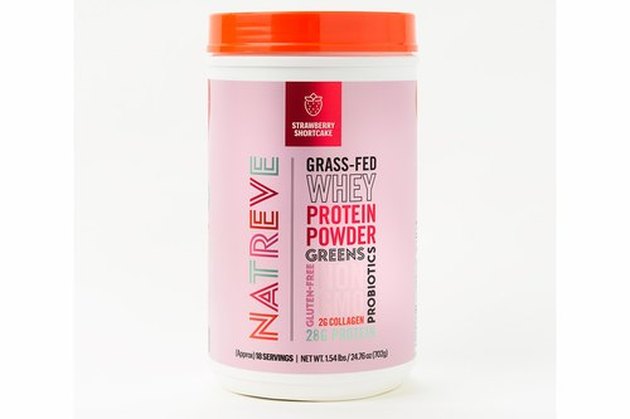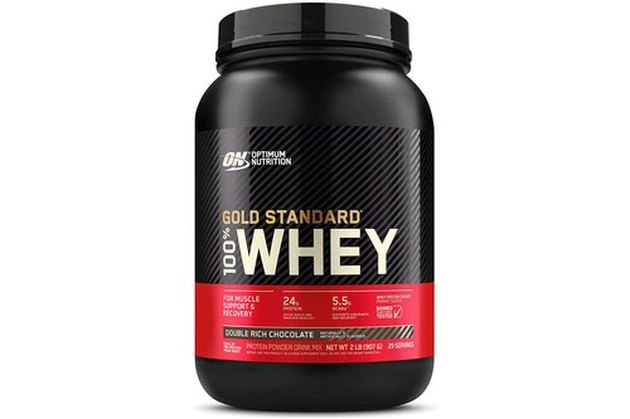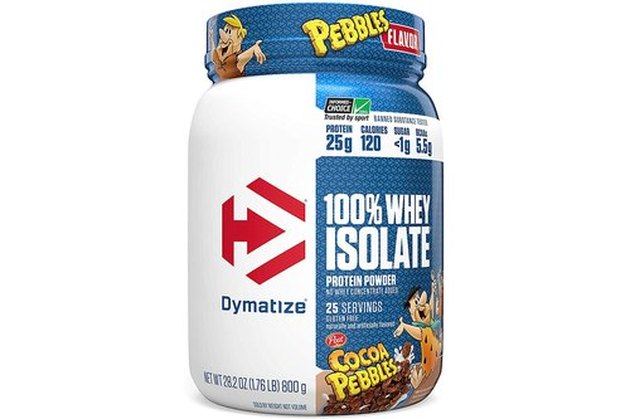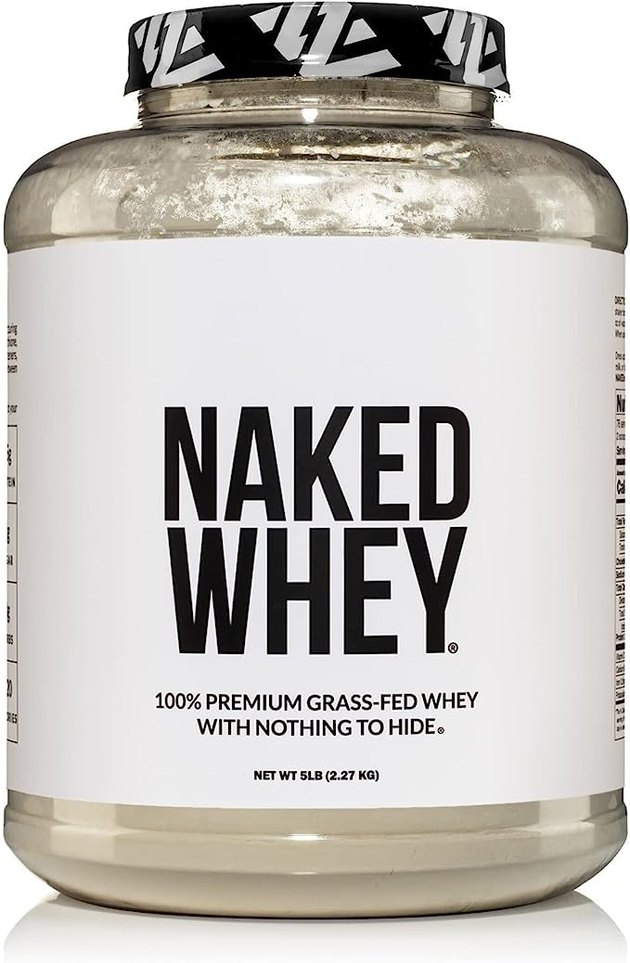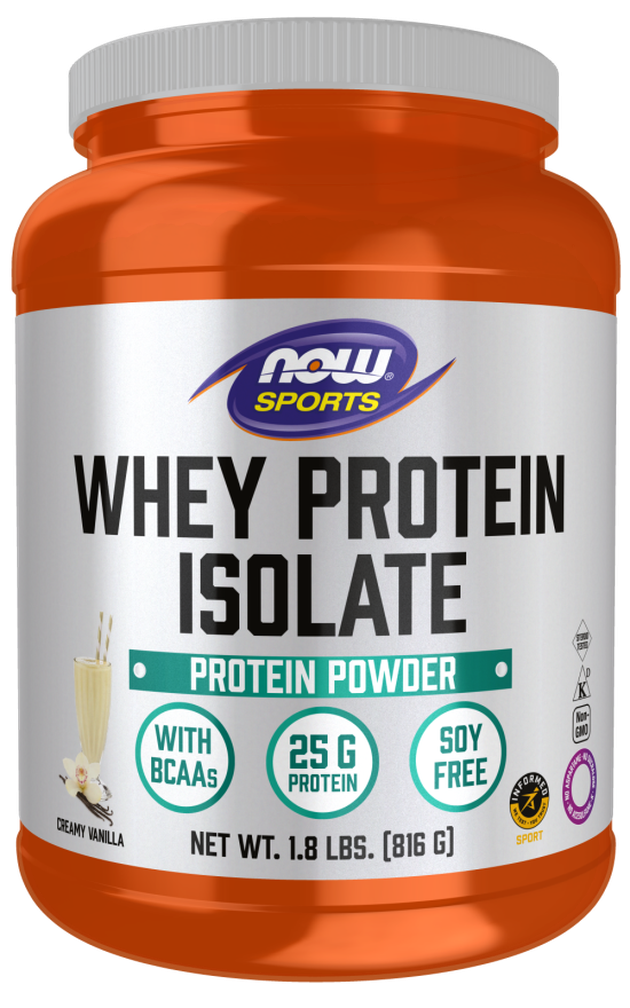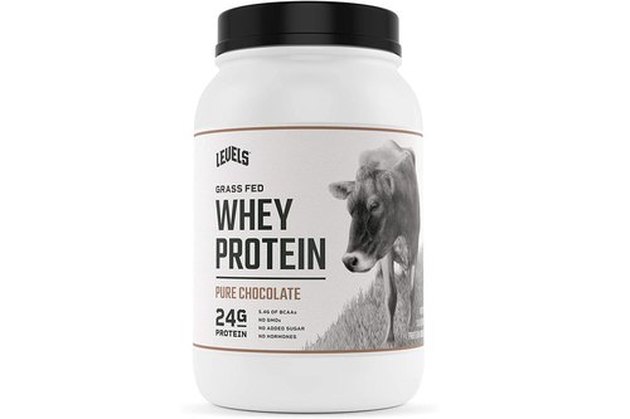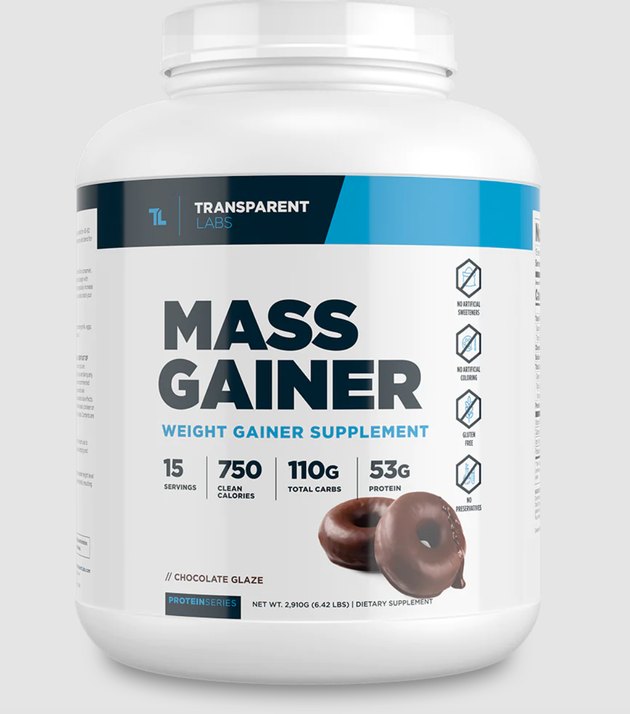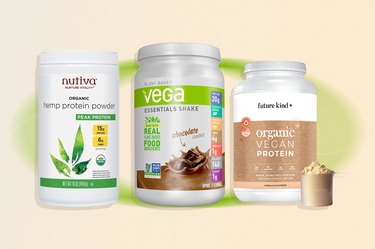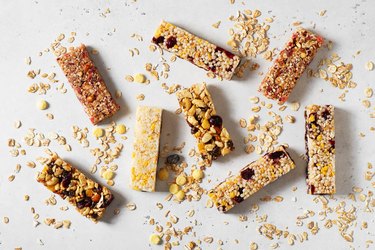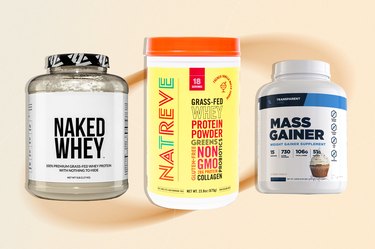
Protein powder is a convenient way to get more of the macro into your diet — and whey just happens to be one of the most popular choices for those looking to supplement their meal plans.
"Whey is one of two proteins found in cow's milk," says dietitian Kayla Girgen, RD, founder of Nutrition Untapped. (The other protein in milk is casein.) "Whey protein is a complete protein, which means it contains all nine essential amino acids. Essential amino acids are building blocks of protein that our body cannot make on its own and must be consumed from our diet."
Video of the Day
Video of the Day
Whey protein is effective because it digests quickly and has a high concentration of the branched-chain amino acids (BCAAs) leucine, isoleucine and valine, Girgen says. "Because of its fast absorption and amino acid profile, whey protein is thought to be an ideal post-workout supplement," Girgen says.
There are three main types of whey protein:
- Whey protein concentrate: Whey protein concentrate is the least processed type of whey and consists of 70 to 80 percent protein, Girgen says. The remaining 20 to 30 percent is made up of other components in whey, including lactose (a type of sugar found in milk and some dairy products), fats and micronutrients. Whey protein concentrate is a good option for folks looking for a balance between protein content and nutritional value.
- Whey protein isolate: This type of protein is processed to remove most of the non-protein components (such as fats and lactose), which results in a higher protein concentration at around 90 to 95 percent or more, Girgen says. So if you're shopping for a protein powder solely to help you add more protein to your diet (and nothing else), isolates might be your best bet. But because of the higher protein concentration, isolates tend to be a bit pricier than concentrates.
- Whey protein hydrolysate: Whey hydrolysate is a form of pre-digested whey protein, meaning it has undergone processing to break down the proteins into smaller strands. This helps the protein absorb into the bloodstream more quickly, Girgen says.
Now that you know the basics, read on for the best whey protein powders.
Protein Powder Serving Size
The standard serving size for protein powders is one to two scoops (25 to 50 grams). Check the instructions on the package to confirm before using the product.
How We Chose
Supplements — including protein powders — are not closely regulated by the U.S. Food and Drug Administration (FDA), so we spoke to a dietitian for her recommendations and included products that are third party-certified by either of the following organizations:
These third-party certifications ensure that the product matches the supplement facts label and doesn't contain any unwanted substances or additives.
We also chose products based on our own expert testing and the following criteria:
- Ingredients
- Protein sourcing
- Taste
- Texture
1. Best for a Meal Replacement: Natreve Grass-Fed Whey
Per 1 scoop: 140 calories, 0 g total fat, 85 mg sodium, 7 g carbs, 1 g sugar, 28 g protein
If you're looking for a protein powder to use as a meal replacement, you'll want an option that also contains fiber and other important nutrients to keep you fuller for longer — and Natreve provides just that.
One scoop contains 28 grams of protein, which includes 2 grams of sustainably sourced marine collagen and 6 grams of BCAAs, as well as 5 grams of fiber to keep you satiated. It also has organic greens and probiotics to support a healthy gut.
The brand's protein powders are all Informed Sport Certified, which means they've undergone testing to ensure they're safe and not contaminated with substances that are banned for athletes. Plus, these come in delicious flavors that aren't too sweet, like Fudge Brownie and Strawberry Shortcake.
2. Best Budget Whey: Optimum Nutrition Gold Standard Whey
Per 1 scoop: 120 calories, 1.5 g total fat, 50 mg sodium, 3 g carbs, 1 g sugar, 24 g protein
"Optimum Nutrition's Gold Standard protein is a whey blend that includes whey protein isolate and whey protein concentrate," Girgen says.
This line of protein is NSF Certified for Sport, meaning it's third-party tested for harmful ingredients. It has over 5 grams of BCAAs to help you build muscle and enhance your workout.
At around 92 cents per ounce (for the big 5-pound container), it's one of the most budget-friendly products out there. And it has many delicious flavors for you to choose from, including Chocolate Hazelnut, Rocky Road, White Chocolate, Chocolate Peanut Butter, Mocha Cappucino and more. Just note that while this pick is free of added sugar, it does contain some artificial sweeteners.
3. Best Tasting Whey: Dymatize ISO100 Hydrolyzed Whey
Per 1 scoop: 120 calories, 0.5 g total fat, 140 mg sodium, 2 g carbs, <1 g sugar, 25 g protein
This protein blend is made of all three types of whey (concentrate, isolate and hydrolysate) and boasts 25 grams of protein and less than 3 grams of carbohydrates per serving.
It's gluten-free, contains no added sugars (but does contain artificial sweeteners) and is third-party certified by Informed Choice Trusted by Sport, an organization that tests for impurities and banned substances. Best of all, it's super tasty.
"Dymatize is known for its versatility and delicious flavors," Girgen says. Indeed, it comes in Chocolate, Simple Vanilla, Fruity Pebbles and Cocoa Pebbles (which should satisfy your childhood nostalgia). Unlike other powders, Dymatize's texture is smooth — not chalky — and it mixes well with milk, dairy-free milk and even water. Add this powder to oatmeal (aka "proatmeal") or coffee for a quick, protein-rich breakfast.
4. Best Unsweetened Whey: Naked Grass-Fed Whey
Per 2 scoops: 120 calories, 2 g total fat, 45 mg sodium, 3 g carbs, 2 g sugar, 25 g protein
This pick contains just one ingredient: whey protein concentrate — and it's sourced from small dairy farms where the cows are grass-fed year-round. "It's GMO-free, growth hormone-free and contains no artificial colors, sweeteners or flavors," Girgen says.
It contains 5.9 grams of BCAAs to help with workout recovery. Plus, it's certified by Informed Choice Trusted by Sport. Girgen recommends this plain, unsweetened whey for baking or adding to any recipe to pump up the protein.
5. Best Vanilla Whey: NOW Foods Creamy Vanilla Whey
Per 1 scoop: 120 calories, 0.5 g total fat, 50 mg sodium, 2g carbs, 25 g protein
If you're looking for a subtle-tasting vanilla protein powder that works well in recipes as well as mixed with water on its own, go for NOW Foods' creamy vanilla whey. It's gluten-free, hormone/RBST-free and certified kosher, with no fillers or artificial flavors — it's just sweetened with stevia and xylitol, a sugar alcohol.
Each serving contains 25 grams of whey protein isolate, as well as 3 grams of leucine. And we also love that this pick is low in sodium (with just 50 milligrams in one scoop) as well as low in cholesterol (with 5 milligrams per scoop), deeming this protein powder suitable on a heart-healthy diet.
Another bonus: It's Informed Sport Certified, so you know each batch has been tested for banned substances and is suitable for people who work out.
6. Best Grass-Fed Whey: Levels Grass-Fed Whey Protein
Per 1 scoop: 130 calories, 2.5 g total fat, 60 mg sodium, 3 g carbs, 2 g sugar, 24 g protein
"This whey concentrate is made from grass-fed protein," Girgen says. "It's free of artificial fillers, flavors, and sweeteners and is GMO- and soy-free." What's more, the Levels brand independently tests its products for harmful ingredients such as heavy metals, so you know this protein powder is a safe bet.
Levels lightly sweetens their whey with monk fruit extract and stevia. Standout flavors include Cold Brew (perfect for blending with banana and unsweetened oat milk for a morning shake) and Vanilla Cinnamon (try adding a scoop to your pancake mix). Each serving contains 24 grams of protein and 5.4 grams of the BCAAs leucine, isoleucine and valine.
7. Best Whey for Weight Gain: Transparent Labs Mass Gainer
Per 2 scoops: 790 calories, 14 g total fat, 610 mg sodium, 114 g carbs, 17 g sugar, 53 g protein
"This blend of whey proteins makes a great post-workout for anyone looking to gain mass after a hard lift at the gym," Girgen says. "The 2:1 carbohydrate to protein ratio helps feed and repair muscles for a speedy recovery." The carbs come from tapioca, sweet potato and oats while the protein comes from grass-fed whey concentrate.
It's free of artificial flavors (unlike many other mass gainers) and is sweetened with stevia and monk fruit instead. A two-scoop serving packs 790 calories and 53 grams of protein.
"This whey protein supplement is fortified with a fruit and vegetable blend as well as fiber and probiotics for optimal gut health" she adds. "It can be used as a meal replacement or post-workout."
Big bonus: Transparent Labs truly lives up to its name as it tests its product line with a third party and shares the results on the site.
What to Consider When Choosing a Whey Protein Powder
Certifications
"Because supplements are not closely regulated by the FDA, some people opt for whey protein that is NSF Certified for Sport or Informed Choice Trusted by Sport," Girgen says.
These third-party certifications confirm that the product matches the supplement facts label and doesn't contain any unwanted substances or additives.
"The NSF Certified for Sport or Informed Choice symbol helps protect consumers and ensures they are getting what they pay for — nothing less and nothing more," she says.
Budget
Whey protein hydrolysate and micellar whey tend to be more expensive — but that doesn't necessarily mean they are better, Girgen says.
If the price tag is important to you, Girgen says whey protein concentrate is typically the most affordable of the whey proteins. While it may not have as much protein per ounce as whey protein isolate, it's still a nutritionally sound choice that can help you meet your protein goals.
Health Goals
Consider the different types of whey and how they can help your health goals.
If your goal is weight gain, you might want to pick a hydrolysate form of whey — and if your goal is weight loss, you might want a micellar whey.
"Whey protein hydrolysate is pre-digested and absorbs much more quickly into the bloodstream (keep in mind that whey protein is already very fast-digesting!). Because the hydrolysate form of whey is absorbed so quickly, it causes a greater insulin response which isn't always desirable — especially for weight loss," Girgen tells us.
"Micellar whey, on the other hand, is a form of whey that is digested slowly resulting in a slower insulin response in the bloodstream."
Allergies
"Anyone with a milk protein allergy should avoid any and all types of whey and casein proteins," Girgen says.
Whey protein isolate might be the best bet for anyone who has lactose intolerance because it contains less lactose compared to whey concentrate, Girgen says.
